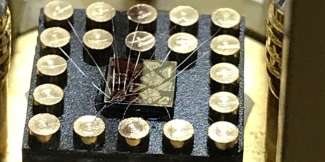Science X Dialog
Science X Dialog is where researchers can share news and information about their own published journal articles.
How to apply

Dialog / Solar cells inspire Li-ion batteries
Solar energy is at the forefront of the global shift toward producing sustainable energy sources and addressing energy poverty. However, the intermittent nature of solar energy limits its use for applications such as IoT ...

Dialog / Breakthrough in enhancement of hole mobility in strained germanium leads to emergence of new class of quantum materials
Semiconductor materials are the foundation of modern electronic, photonic, photovoltaic, thermoelectric and many other semiconductor devices, which are integral for computers, mobile phones, gadgets, home appliances, cars ...

Dialog / Van der Waals integration permits novel hetero-integrated photonic devices and flexible optical applications
Today, electronic and photonic devices are ubiquitous in smart phones, computers, light sources, sensors, and communications. To underpin the demand for optoelectronic applications, functional materials are essential. For ...

Dialog / How forest density slows granular flows
One way to reduce the damage caused by avalanches in the mountains is to place obstacles in their path. These obstacles can be artificial barriers or natural forests. Knowing how the avalanche interacts with obstacles is ...

Dialog / Genes on the move: Mapping the pathways of horizontal gene transfer
In the past few decades, there has been a rise in antibiotic-resistant infections, which are becoming an increasingly urgent public health concern. According to the World Health Organization, at least 700,000 people die each ...

Dialog / Quantum engineering meets nanoscale data processing: Unleashing the power of light-driven conductivity control
Over the past few decades, the field of data processing and transferring technology has advanced at a rapid pace. This growth can be attributed to Moore's Law, which predicts that the number of transistors on a microchip ...
Dialog / Revisiting semiconductor heat management through nanotechnology
Nanotechnology has significantly impacted the semiconductor industry, enabling the production of transistors that are just a few nanometers in size. While the miniaturization of electronic components has resulted in higher ...

Dialog / Disaster response and recovery must include mental health support plan
Disasters are disruptive to one's state of normalcy, including daily routines, activities of daily living, employment, transportation, housing, and social relations. Disasters can take a serious toll on the mental health ...

Dialog / Nanoscale 'diamond rings' provide unconventional giant 'magnetoresistance' for the development of new quantum devices
In recent years, technological advancements have made it possible to create synthetic diamonds that have similar physical and chemical properties to natural diamonds. While synthetic diamonds are not considered "fake" or ...

Dialog / Commonly used self-test for age-related macular degeneration found to be inaccurate
Age-related macular degeneration (AMD) is one the most prevalent eye diseases. In the late stage of the disease, newly formed vessels in the retina alter its structure, which leads to blurry and distorted vision. This condition ...

Dialog / We developed an algorithm to massively improve hydrogen fuel cell imaging and water modeling
We developed an algorithm to massively improve images of hydrogen fuel cells, with future applications in medical scanning.
Dialog / New semiconducting borophene paves the way for the lightest high-performance transistor
In the year 1808, French chemists Joseph-Louis Gay-Lussac and Louis-Jacques Thenard, and independently, English chemist Humphry Davy, discovered the fifth element of the periodic table—boron. In crystalline form, boron ...